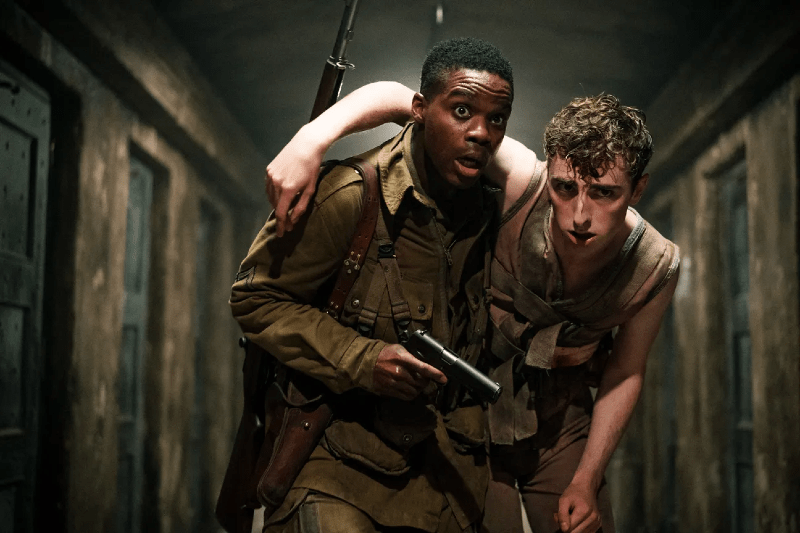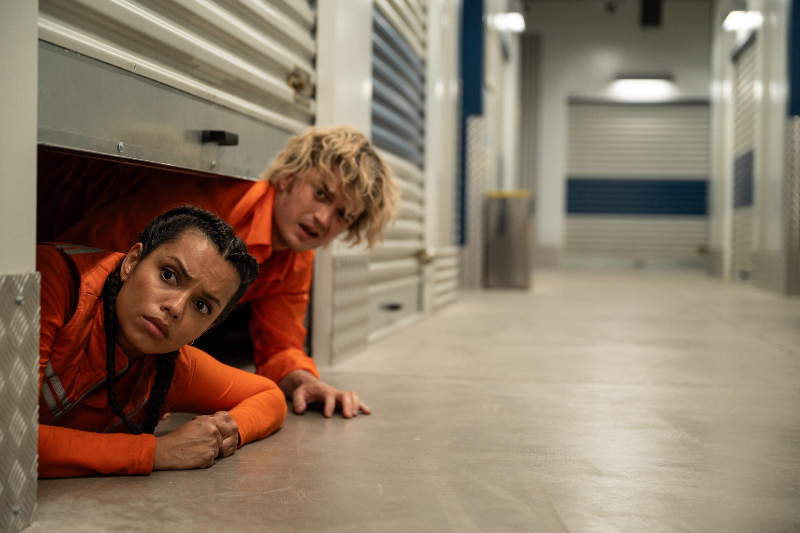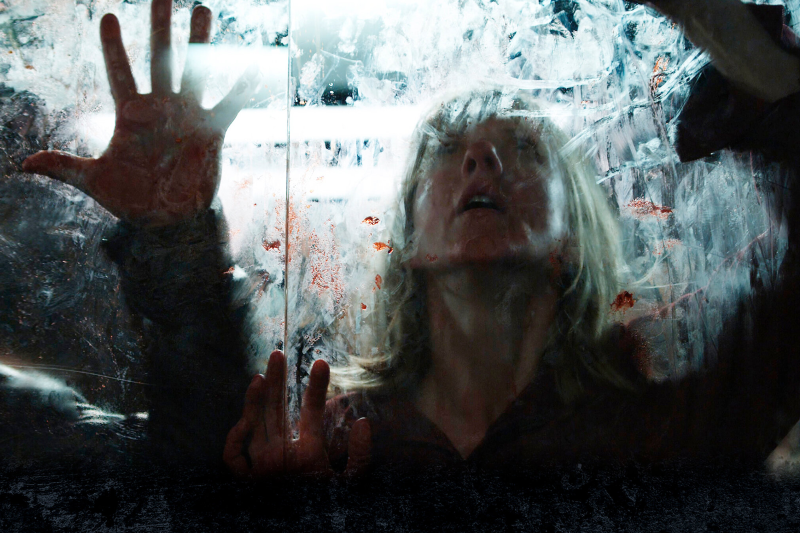If a movie is released with dismal marketing and appalling timing, was it even released? It’s a twist on an old philosophical question that has an easy answer. Just as we are arrogant enough to speculate that human perception determines an event’s significance and the shape of the universe itself, simply assuming a movie like Julius Avery’s Overlord has no value is indicative of what kind of movies the industry deems worth investing in.
That said, it’s not difficult to see why Avery’s sophomore feature came and went without much notice despite more than generous reviews that nevertheless fell short of widespread acclaim. Overlord is a genre mashup that contains a whole lot of elements that are more than familiar, as a light description of the plot would evoke visions of Castle Wolfenstein to any self-respecting gamer. Perhaps Variety’s Amy Nicholson had something of a point when she wrote that fans of said game might just “find themselves reaching for the controls out of habit.”
But Overlord isn’t trying to reinvent schlock. In the film, a diverse(ish) group of good American soldiers are shot out of the sky on their way to destroy a radio tower in a small French village so D-Day can continue. The bedraggled handful of survivors are committed to finishing their mission in the Nazi-occupied hamlet, only to discover that the Germans are conducting some grisly experiments on the locals, and their zombifying efforts may pay off to the detriment of the entire world.
Nothing new to see here, but audiences were nevertheless ripe and ready for a tale of good versus evil sans complications when America was firmly on the side of good in a righteous crusade. Overlord was released in 2018, a time period most of us would likely rather block out — right in the midst of the Trump presidency. The year before, white supremacists grabbed tiki torches and charged through Charlottesville, and even the most oblivious were being forced to reckon with many of the darker undercurrents of American society, which were grossly at odds with the country’s self-proclaimed image as of a shining beacon of freedom.
Why Overlord was pushed from its initial October release to November — thus removing it from all the potential benefits of the Halloween-themed box office — likely flows directly from those undercurrents. The movie’s surrogate everyman is Edward Boyce (Jovan Adepo), a Black man whose mastery of French can be traced to his Haitian grandmother and is a mere three months removed from civilian life. Avery’s B-movie sensibilities also mostly dispense with the American brand of racism and leave that kind of thing to the Nazis, and Boyce’s fellow soldiers are the kind of variety that could be loosely referred to as inclusive. For the most part, they remain firmly likable, with hardened explosives expert Lewis Ford (Wyatt Russell) the only outlier that could approach being the exception to the rule.
But a distinctive style often makes all the difference, and Avery brings in the action, quickly introducing the major and very distinctive characters in Boyce’s paratrooper squad. Audiences barely have time to wonder who’s going to be on the perhaps literal chopping block before Avery obliterates nearly all of them in a thrillingly chaotic sequence that would make Sam Raimi proud. We’re enmeshed right into Boyce’s viewpoint as the plane is shot to bits, with bullets and vomit alike flying as he parachutes from a chaotically war-torn sky into the water, cutting himself out of his parachute just in time to inhale a desperate gasp of air in the midst of the watery debris.
It’s electrifying stuff, with survivors pared down yet again by German night patrols and landmines by the time they reach the village and meet the token girl, Chloe (Mathilde Ollivier). Chloe resides with her ailing aunt and adorable eight-year-old brother Paul (Gianny Taufer), because having him be her son would mean she was (shudder) older than many of the soldiers who use her home as a would-be rallying point while they try and complete their mission.
The human element partners well with the gleefully dark gore – the standout is when Boyce sneaks into the church and discovers what the Nazis have been up to. It’s a nearly wordless sequence, and Adepo is all wide-eyed terror and grimly focused determination as he discovers a talking, disembodied head and spine, moaning creatures locked away in cells, and liquid-filled sacks with people fast on their way to being transformed into something inhuman.
Boyce’s vulnerability hardly needs to be stated since his Blackness in Nazi Germany eschews disguise as any kind of option. Yet he manages to not only escape but rescue Jacob Rosenfeld (Dominic Applewhite), a Jewish member of their troop who was captured. There’s a whole lot to relish in the two men — both an obvious stand-in for communities that may have the most to lose from an Axis victory — not only giving Nazis the slip but living to fight another day.
The less-than-stellar staples of the genre(s) are there, too, including gaping plot holes and baffling character choices — not to mention that many of the plot developments are far too predictable to be anything resembling twists. That’s likely beside the point if you’re a fan of the action, sci-fi, horror, and war elements that coalesce to such delightfully dark, delicious ends in Overlord. The film even gives us a villain so dastardly he’s willing to kidnap and torture a child, and whose outside comes to match his sickeningly macabre interior.
Under those circumstances, originality can be overrated, especially when there’s no official IP involved. It’s too bad the marketing also seemed confused as to how to promote Overlord, with the trailer coming off as a baffling jumble of content rather than a cohesive whole and placing such emphasis on producer J.J. Abrams’s involvement that he is the sole cast credit on the movie’s poster.
Of course, even with all the horrors on display, movies like Overlord obviously don’t compare to the real horrors of fascism (especially as they’re threatening to repeat themselves). In the years ahead, Overlord should remain a grotesque coping mechanism, a way to grapple with the reality of what we’re really capable of inflicting on each other — something no mere movie could match. In such cases, sitting back and watching clearly good guys fight bad guys who are so evil they spit on baseballs can be genuine comfort food.






